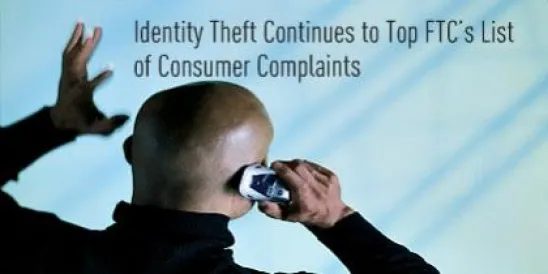For more than a decade, the Federal Trade Commission has been releasing its list of the top ten categories of consumer complaints received by the agency in the previous year. This list always serves as a good indication of the areas toward which the FTC may choose to direct its resources and increase its scrutiny.
For the 12th year in a row, identity theft was the number one complaint received by the FTC. Out of more than 1.8 million complaints the FTC received last year, 15% – or 279,156 – were about identity theft. Of those identity theft complaints, close to 25 percent were related to tax or wage-related fraud. The number of complaints related to identity theft actually declined in 2011 from the previous year, but this type of fraud still topped the list.
Most identity theft complaints came from consumers reporting that their personal information was stolen and used in government documents — often to fraudulently collect government benefits. Complaints about government document-related identity theft have increased 11% since 2009 and represented 27% of identity theft complaints last year. These numbers are likely to increase as concerns about consumer data privacy continue to garner the attention of the FTC.
After ID theft, the FTC’s top consumer complaints for 2011 were as follows:
• Debt collection complaints
• Prizes, sweepstakes, and lotteries
• Shop-at-Home and catalog sales
• Banks and lenders
• Internet services
• Auto-related complaints
• Imposter scams
• Telephone and mobile services
• Advance-fee loans and credit protection or repair
While credit cards are intertwined with many of the above complaints, complaints about credit cards themselves are noticeably absent from the 2011 list. In past years, credit card fraud was a major source of complaints from consumers. The drop in credit card-fraud-related complaints, however, is not surprising given the passage of the Credit CARD Act of 2009. This landmark federal legislation banned interest rate hikes “at any time for any reason” and limited the instances when rates on existing card balances could be hiked by issuers. The law also required lenders to give customers at least 45 days advance notice of significant changes in terms to allow card users time to shop around for better terms.
With the upcoming changes to the FTC’s advertising guidelines, there may very well be new additions to the consumer complaint list next year. Those complaints that already appear on the list are also likely to receive increased scrutiny.



 />i
/>i
